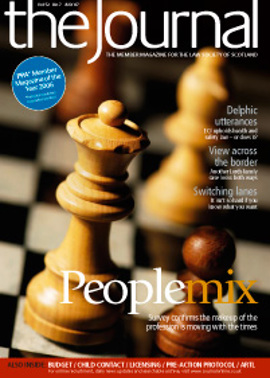Fraud: no hiding place

Fraud has become far easier to commit over the last quarter century. Criminals have ways of finding people to disclose sensitive company information, and if you sit on your hands rather than coming clean over any loss of client information, you risk serious sanctions at a later date.
These were among the many lessons to be learned from the Society’s conference “The Many Faces of Fraud”, held in the Business Learning Conference Centre, Dunfermline, on 24 May. Solicitors from all types of practice gathered to hear of the constant need for vigilance.
Frank Shennan, a journalist with a special interest in fraud stories, opened the presentations by relating a series of corporate mishaps through Nationwide Building Society and TK Maxx to the US Veterans’ Association, offering five rules to minimise loss of reputation should something go wrong: come clean; clean up; tell all; tell it early; and tell it yourself.
Among other speakers, Andy May of Lothian and Borders Police suggested that “ID fraud” was a more accurate term than the commonly heard “ID theft”, and can cause problems for the prosecution in Scotland as the real victims – those whose identities have been misused – are often unwilling to come forward. It should, he said, be made a separate offence as it is in England & Wales. He admitted that the police are a bit behind the criminals especially with corporate ID fraud, describing Companies House as a “fraudster’s paradise” because of all the information in the public domain.
Scott Barnett of the enforcement agency SCDEA then shed some light on the methods used to capture supposedly secure information such as passwords – Trojans, spyware, bogus websites and the like – and other speakers on risk management, forensic accountancy, money laundering and more, ensured that delegates had their money’s worth from the day.
As Frank Shennan put it, you can lose your good name even though no one actually steals from you. But his “good practice” story happened to concern a law firm – after finding itself compromised, it called a press conference, admitted a mistake, apologised and confirmed that steps had been taken to remedy the situation and prevent a reputation. “The story made a page lead in the papers the next day and was then dead”, said Shennan.
See also Hearsay, p 56.
In this issue
- The power of marks: Frankie goes after Hollys name
- Confidentiality clauses - beware!
- Into the fast lane
- All change please...!
- Benchmark for practice
- Old, new, borrowed and blue
- Old, new, borrowed and blue (1)
- The Oracle has spoken
- High road, low road
- Point of contact
- Stuck in a rut?
- Counsel's fees - a reply
- Fraud: no hiding place
- A chance to shine
- CDD is the new ID
- System integrity
- Professional negligence: Pre-Action Protocol
- Not just a fancy name
- More on "enough is enough"
- Are you up to the Act?
- Saving energy - and effort
- Takeover goals
- Expensive consequences
- Expensive consequences (1)
- Scottish Solicitors' Discipline Tribunal
- Website reviews
- Book reviews
- Time (to prepare) please!
- ARTL - now and then?






